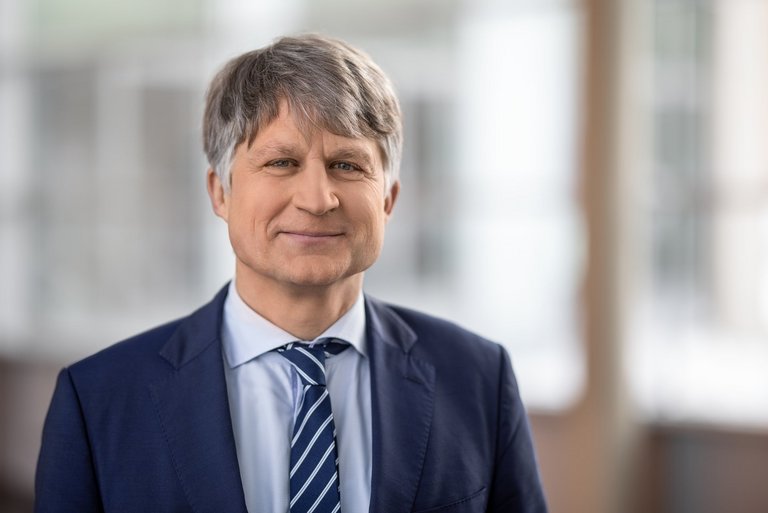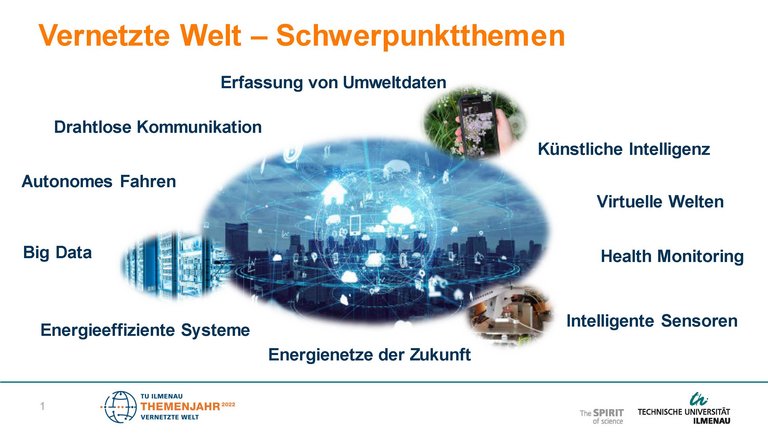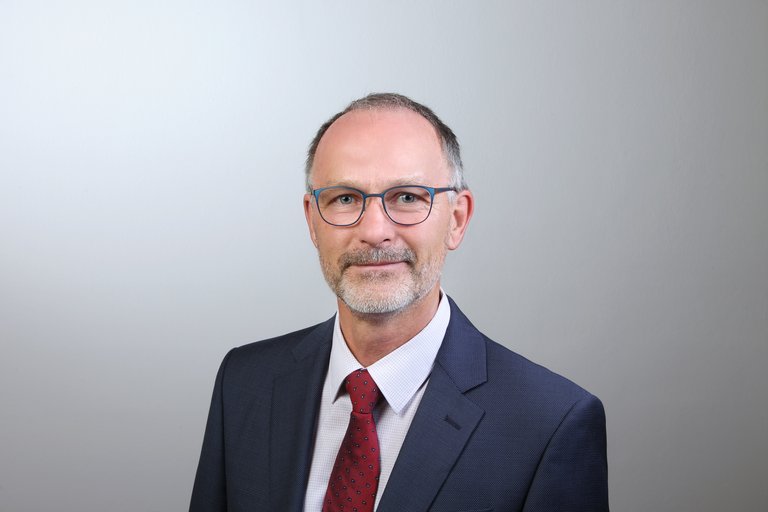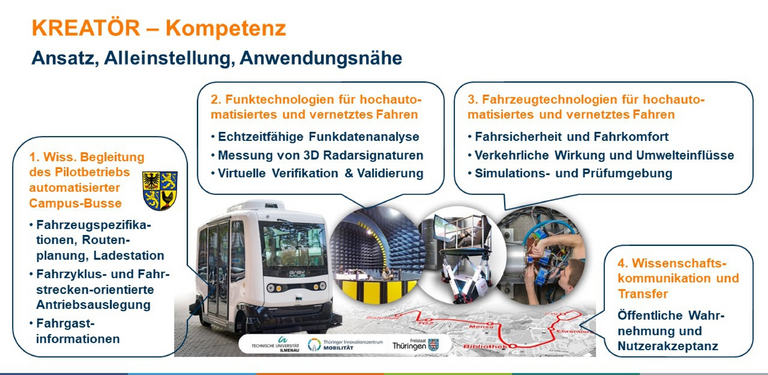TU Ilmenau is dedicating this year's scientific year to the "Smart World". Events, lectures and publications in 2022 will focus on the numerous research activities, ideas and solutions of scientists at the university that contribute to making our new "Smart World" more comfortable, environmentally friendly and safe.
![[Translate to English:] [Translate to English:]](/unionline/fileadmin/_processed_/c/8/csm_Themenjahr_smart_world_0dc6013b9c.jpg)
With this, the university would like to give the public at the same time insights into the work of TU Ilmenau with national and international partners from science and industry around the complex subject area and invite dialogue on socially highly relevant topics, said the Vice President for Research and Young Scientists, Professor Stefan Sinzinger on the occasion of the opening of the theme year 2022 on January 26:

With the scientific years, the university places global questions about the future at the center of its research and focuses on contributions to solving major societal challenges. In this way, we want to promote transparent exchange between science and the general public and further sharpen our research profile. At the same time, the theme year is intended to highlight the diversity of issues and challenges of our time to which the scientists at our university are devoting themselves in the service of society.
Professor Sinzinger highlighted the breadth and complexity of the "Smart World" theme with an overview of the application fields in which TU Ilmenau is working on a large number of research projects as part of its research profile lines "Functional Materials and Technologies", "Intelligent Sensors and Precision Measurement Technology" and "Complex Systems and Data-Intensive Engineering".

Kick-off lecture on automated and connected driving
The kick-off event for the scientific year took place in hybrid form and could be followed via livestream. Following the opening remarks, the director of the Thuringian Innovation Center for Mobility (ThIMo) and head of the RF and Microwave Research Group, Professor Matthias Hein, presented innovative contributions to the topic of automated and connected driving using the example of current research projects. The work fits into the Federal Republic of Germany's agenda for mobility of the future, as anchored in the joint action plan "Research for Autonomous Driving" of the Federal Ministries of Education and Research, Economics and Climate Protection, and Digital Affairs and Transport. It states:
The mobility of the future should be sustainable, intelligently connected and, above all, safe. Autonomous driving offers groundbreaking solutions here.
Based on the complex issues that need to be solved, especially with regard to the safety of automated and connected vehicles, Professor Hein provided insight into the multitude of tasks and innovative solutions along the entire research chain from design to functional validation and reproducibility of results, with which scientists from 13 disciplines and four faculties at the Thuringian Innovation Center Mobility (ThIMo) at TU Ilmenau support the worldwide structural change of the automotive industry.

Since the situation in real road traffic can change at any time and is unpredictable, the development of safe wireless sensor and transmission methods, of design and test procedures, and finally of procedures for the virtual verification and validation of cognitive vehicles requires an enormous amount of research. "How safe is safe enough?" is thus also the central research question of the VIVALDI project, which is embedded in the German-Japanese research cooperation VIVID and deals with promising methods for safeguarding automated and connected driving functions. To this end, ThiMo offers state-of-the-art measurement and testing equipment in a total of five fields of competence related to the topic of sustainable mobility. Especially in the competence fields "Radio and Information Technology" and "Vehicle Technology", the research laboratory "VISTA: Virtual Road - Simulation and Test Facility", research vehicles, further measurement and analysis systems and a virtual driving simulator provide an excellent research infrastructure for the development of sustainable digital mobility solutions.
It also forms the basis for the accompanying scientific research conducted by the TU Ilmenau as part of the current project "KREATÖR - Radio and Vehicle Technologies for Automated Passenger Transport in Public Spaces". Professor Hein:
The goal of the project is a new transport service offered by the city of Ilmenau and the Ilm district, in which driverless shuttles connect the campus of the TU Ilmenau to the city's train station. The project is the first time in Thuringia that highly automated driving has been integrated into the timetable of a passenger transport company. The particular novelty here lies in the research-based preparation for higher levels of automation and networking.

The project is being funded by the Thuringian Ministry of Economics, Science and Digital Society in the "Innovation Potentials" funding format with around two million euros and managed by the Thüringer Aufbaubank. Particular attention is being paid to the automated buses, which will start operating in summer 2022 for an initial period of two years. The procurement of the buses is being funded by the Thuringian Ministry for the Environment, Energy and Nature Conservation.
The discussion that followed the lecture made it clear that the topic of safe, connected, sustainable and efficient mobility is both a strongly interdisciplinary and a future topic of great social relevance. At the end of the kickoff event, Professor Hein and Professor Sinzinger therefore invited the participating scientists and guests to further dialog within the framework of internal and external events of the scientific year.
More information on projects and research work at the university around the scientific year 2022 "Smart World" on the website: Scientific Year 2022 "Smart World".

